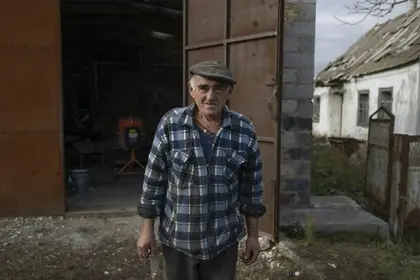The tractor driver and the nurse who became his wife during the war think they must have helped 2,200 villagers cross a river under Russian shelling to Ukrainian-held land.
Neither knows how — or why — the Russians never killed them before fleeing the upper stretches of the flashpoint Kherson region on Ukraine’s southern front one month ago.
JOIN US ON TELEGRAM
Follow our coverage of the war on the @Kyivpost_official.
The retirement-age couple felt watched the entire time by the forces occupying their village of Arhanhelske on the Inhulets River.
“God spared us,” tractor driver Anatoliy Maystrenko said with a glance at the gloomy sky.
Around him lay the booby-trapped ruins of a battle marking one of the turning points of the eight-month war.
Bloodied Russian uniforms littered curbsides and the stench of death wafted in from garages lining the mangled pavement.
Heavy thuds of controlled explosions echoed every few minutes across fields dotted with cluster munitions and mines.
Silent Ukrainian troops hauled heavy shells from the blackened remains of a highrise the Russians had used as their base.
The invaders abandoned their stockpiles while fleeing a Ukrainian counteroffensive.
What they left behind was either too dangerous to touch or blasted apart by artillery and rocket fire.
‘They were watching’
Nurse Antonina Voytseshko tried to play down her role in the villagers’ escape over a six-month stretch starting in April and ending in the Russians’ own flight.

EU Transfers €1.5 Bln Raised From Russian Assets for Ukraine
The 59-year-old led small groups of people who had snuck out from nearby hamlets to a secret spot where her new husband lay in wait.
The tattooed 63-year-old tractor driver would then load the frightened people onto rubber dinghies and row with all his might.
“The shells would fall on the banks while we were in the water. All sorts of things would happen,” Maystrenko said.
He would occasionally smuggle Ukrainian sabotage and reconnaissance squad soldiers to the Russian-held side of the river on his return trip.
Maystrenko said one of the Ukrainian soldiers but none of the civilians he had ferried across died.
The nurse used the couple’s farmstead near the river as a safe house where villagers gathered before making their final escape.
“The Russians didn’t let cars leave but they somehow let us go by river,” Voytseshko said.
“We still don’t know why. They obviously saw us. They were watching us the whole time.”
Hemmed in
The west bank of the Inhulets River marked the staging post for the Ukrainians’ push into Kherson from its northern reaches.
Their breakthrough at Arhanhelske on October 3 followed a counterstrike around the northern city of Kharkiv that put Russia on the back foot for the first time in the war.
The Kremlin’s forces soon found themselves stranded between two rivers on the Kherson front.
The Inhulets to the west and the Dnipro to the east left the Russians woefully exposed in their defence of the region’s eponymous capital in this pocket’s southern end.
A simultaneous Ukrainian push into Kherson from the west has left the Russians in danger of losing control of the biggest city they have captured during the war.
Disbelief
Store owner Tamara Prokopiv laughed at the idea that she was standing on Russian land — a claim made by Moscow when it announced the annexation of four Ukrainian regions in September.
The 59-year-old snuck out her two daughters across the river escape route set up by the Arhanhelske couple and then stayed behind in her next-door village of Vysokopillya.
The remains of Vysokopillya today are also comprehensively booby-trapped.
Military officials said 12 civilians had been hospitalised after touching various hidden explosives in the past week alone.
At least one of them is known to have died.
Prokopiv now runs a kiosk selling everything from candy to tea pots out of the entrance of a de-mined building on the village’s main street.
“They degraded your dignity. You were nothing to them and they were the owners,” she said of the Russian soldiers.
“They never hurt or beat me. But they also never offered me anything to eat. I was hungry and wanted to eat.”
She said she shook in disbelief when her neighbour told her that she saw Ukrainians soldiers on the other end of the street.
“The soldiers hugged me so hard. I felt like they were my children,” she said through tears.
“I now cry from happiness and from grief.”
You can also highlight the text and press Ctrl + Enter






